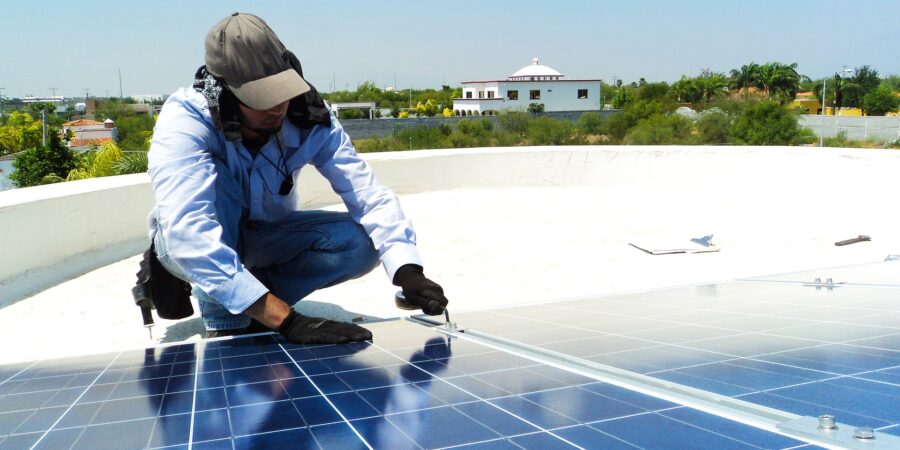The vast potential for change in African countries has long been overlooked. Despite technological advancements, achieving a remarkable increase in efficiency by over 22% for the best solar panels in the solar industry, half of Africa’s 1.2 billion population still lacks access to electricity. As the continent’s economic growth outpaces other major regions, the urgency to bridge this usage gap becomes paramount, making Africa’s energy choices crucial, despite its current limited emissions contribution.
Bridging the Energy Gap
In the quest for sustainable and accessible energy solutions, Africa is emerging as a powerhouse, not just in terms of natural resources, but also in terms of innovation and determination. With an abundance of sunshine throughout the continent, solar energy presents a remarkable opportunity to bridge the energy gap that has hindered progress and economic development for far too long.
To put things into perspective, Africa is home to 17% of the world’s population, yet it accounts for only 4% of global energy demand. This glaring disparity highlights the urgent need for reliable and affordable energy solutions to power the continent’s growth. And solar power, a renewable energy source, holds immense potential for Africa’s energy revolution.
Africa’s Path to Energy Independence
Traditionally, Africa has heavily relied on fossil fuels and traditional biomass for energy production, leading to harmful emissions, high costs, and limited access. However, the tide is turning as Africa embraces its abundant solar resources. The continent is uniquely positioned to harness the potential of solar power, with over 300 days of sunshine per year in many regions.
Investments in solar energy projects have been on the rise, driven by a combination of factors such as decreasing costs of solar technologies, increased political will, and international collaborations. According to this report, Africa experienced significant growth in solar capacity in 2022, with the addition of 989 megawatts (MW). This represents a notable 14% increase compared to the previous year, highlighting the continent’s accelerating adoption of solar energy. This remarkable growth is a testament to Africa’s determination to achieve energy independence and drive sustainable development.
Paving the Way for Solar Growth in Africa
To facilitate the widespread adoption of solar power, innovative initiatives and partnerships are being forged across the continent. The Africa Solar Industry Association (AFSIA) has been instrumental in promoting solar energy adoption, bringing together key stakeholders and facilitating knowledge exchange. Through their efforts, the solar industry in Africa has witnessed significant progress.
One notable project is the Noor Solar Complex in Morocco, the largest concentrated solar power (CSP) plant in the world. With a capacity of 582 megawatts (MW), the Noor Solar Complex showcases Africa’s potential to harness solar energy at scale. The project not only provides clean electricity to the Moroccan people but also exports surplus energy to neighbouring countries, reinforcing the notion of energy interdependence and regional cooperation.
Additionally, the off-grid solar sector has seen remarkable growth, empowering rural communities with access to electricity for the first time. The Pay-as-you-go (PAYG) model, pioneered by companies like M-KOPA Solar allows households to pay for solar systems through affordable instalments, making clean energy accessible to those with limited financial means. As a result, millions of people across Africa now have access to reliable and clean electricity, transforming lives and enabling economic opportunities.
A Promising Future of Clean Energy
To realize the full potential of solar power across Africa, overcoming certain obstacles is essential. Limited distribution grids, inadequate systems to match variable output with demand, and insufficient financing for scaling projects have hindered capacity expansion. Developing cross-border grid systems, similar to those in Northern Europe, requires strong national grids as a prerequisite. Micro-grid systems, often employed in residential or commercial buildings, remain the predominant solar solution in Africa, and their segment is expected to witness the fastest growth.
Africa’s solar awakening not only brings about immediate benefits but also paves the way for a sustainable and prosperous future. The shift towards renewable energy sources not only mitigates the impacts of climate change but also reduces dependence on fossil fuels, fostering energy security and independence. According to IRENA, the renewable energy sector has the potential to create over 4 million jobs in Africa by 2030, providing a much-needed boost to the continent’s economy.
Moreover, embracing solar power aligns with the United Nations’ Sustainable Development Goals, particularly Goal 7, which aims to ensure access to affordable, reliable, sustainable, and modern energy for all. By harnessing the power of the sun, Africa can make significant strides towards achieving this goal and empowering its people.
Adequate infrastructure, policy frameworks, and financial mechanisms are vital to further accelerate Africa’s solar revolution. While significant progress has been made, there is still a need to address certain challenges and unlock the full potential of solar energy in the continent.
Infrastructure development plays a crucial role in facilitating the deployment of solar projects. Enhancing transmission and distribution networks, particularly in remote areas, is essential to ensure that solar-generated electricity can reach the communities that need it most. Investments in grid expansion and modernization are necessary to enable the integration of large-scale solar power plants and maximize their impact.
In parallel, decentralized energy solutions are gaining momentum, especially in regions where grid connectivity is limited. The installation of mini-grids and standalone solar systems can provide clean electricity directly to communities, schools, and healthcare facilities. Governments and stakeholders must prioritize the development of appropriate policies and regulations to support and incentivize these off-grid solutions, fostering an enabling environment for private investments and entrepreneurship in the sector.
By embracing solar energy, Africa has the potential to become a shining example for the rest of the world, proving that sustainable development is not only necessary but also achievable. Let us rally behind this solar revolution, supporting the growth of clean energy in Africa and propelling the continent towards a brighter and greener future for all.





